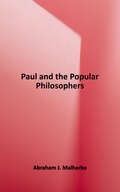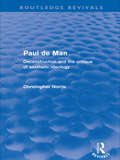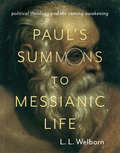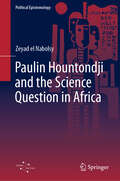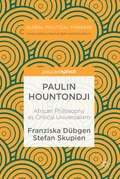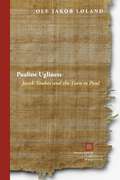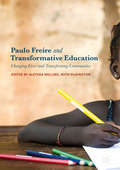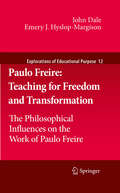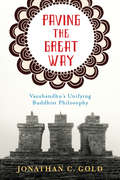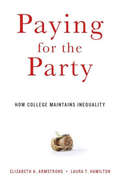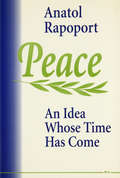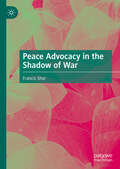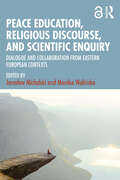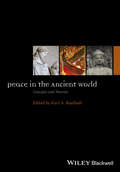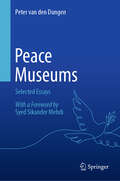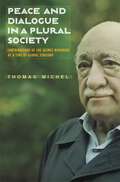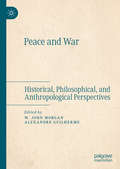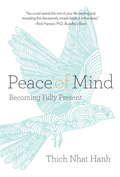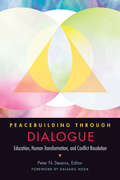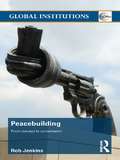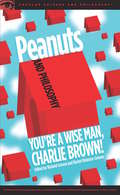- Table View
- List View
Paul and the Popular Philosophers
by Abraham J. MalherbeThese studies continue a tradition of scholarship that flourished around the turn of the century when new editions of ancient philosophical sources were published. Professor Malherbe, however, widens the scope to include other philosophical traditions. <p><p>He recognizes and identifies the influences of Platonists, Peripatetics, Cynics, Stoics, Epicureans, and Pythagoreans. These popular philosophers aimed at moral reform; they shared both in their substance and in the techniques employed. Yet, they need to be distinguished in order to discern their influence, if any, on Paul.
Paul de Man: Deconstruction and the Critique of Aesthetic Ideology (Routledge Revivals)
by Christopher NorrisPaul de Man - literary critic, literary philosopher, "American deconstructionist" - changed the landscape of criticism through his rigorous theories and writings. Upon its original publication in 1988, Christopher Norris' book was the first full-length introduction to de Man, a reading that offers a much-needed corrective to the pattern of extreme antithetical response which marked the initial reception to de Man's writings. Norris addresses de Man's relationship to philosophical thinking in the post-Kantian tradition, his concern with "aesthetic ideology" as a potent force of mystification within and beyond that tradition, and the vexed issue of de Man's politics. Norris brings out the marked shift of allegiance in de Man's thinking, from the thinly veiled conservative implications of the early essays to the engagement with Marx and Foucault on matters of language and politics in the late, posthumous writing. At each stage, Norris raises these questions through a detailed close reading of individual texts which will be welcomed by those who lack any specialised knowledge of de Man's work.
Paul's Summons to Messianic Life
by L. L. WelbornTaubes, Badiou, Agamben, Žižek, Reinhard, and Santner have found in the Apostle Paul's emphasis on neighbor-love a positive paradigm for politics. By thoroughly reexamining Pauline eschatology, L. L. Welborn suggests that neighbor-love depends upon an orientation toward the messianic event, which Paul describes as the "now time" and which he imagines as "awakening." Welborn compares the Pauline dialectic of awakening to attempts by Hellenistic philosophers to rouse their contemporaries from moral lethargy and to the Marxist idea of class consciousness, emphasizing the apostle's radical spirit and moral relevance.
Paul's Summons to Messianic Life: Political Theology and the Coming Awakening (Insurrections: Critical Studies in Religion, Politics, and Culture)
by L. WelbornTaubes, Badiou, Agamben, i ek, Reinhard, and Santner have found in the Apostle Paul's emphasis on neighbor-love a positive paradigm for politics. By thoroughly reexamining Pauline eschatology, L. L. Welborn suggests that neighbor-love depends upon an orientation toward the messianic event, which Paul describes as the "now time" and which he imagines as "awakening." Welborn compares the Pauline dialectic of awakening to attempts by Hellenistic philosophers to rouse their contemporaries from moral lethargy and to the Marxist idea of class consciousness, emphasizing the apostle's radical spirit and moral relevance.
Paulin Hountondji and the Science Question in Africa (Political Epistemology)
by Zeyad el NabolsyThis book offers a systematic reconstruction of Paulin Hountondji&’s contributions to the debate about the place of modern science on the African continent. The book shows that Hountondji develops an account of modern science that is sociologically sensitive to the entanglement between modern science and colonialism on the African continent without falling into epistemic relativism about the claims of modern science. It is argued that Hountondji&’s views on modern science express a strong historical materialist influence, and that he develops a theory of science that draws both on the Hessen-Grossmann hypothesis and dependency theory. Thus, this book brings together two strands of historical materialist thought about science that have hitherto been isolated from one another. This book is of interest to scholars who specialize in African philosophy, history and philosophy of science, global philosophy, and African studies.
Paulin Hountondji: African Philosophy as Critical Universalism (Global Political Thinkers)
by Franziska Dübgen Stefan SkupienPaulin J. Hountondji is one of the most important and controversial figures in contemporary African philosophy. His critique of ethnophilosophy as a colonial, exoticising and racialized undertaking provoked contentious debates among African intellectuals on the proper methods and scope of philosophy and science in an African and global context since the 1970s. His radical pledge for scientific autonomy from the global system of knowledge production made him turn to endogenous forms of practising science in academia. The horizon of his philosophy is the quest for critical universality from a historical, and situated perspective. Finally, his call for a notion of culture that is antithetical to political movements focused on a single identitarian doctrine or exclusionary norms shows how timely his political thought remains to this day. This book gives a comprehensive overview of Hountondji’s philosophical arguments and provides detailed information on the historical and political background of his intellectual oeuvre. It situates Hountondji in the dialogue with his African colleagues and explores links to current debates in philosophy, cultural studies, postcolonialism and the social sciences.
Pauline Ugliness: Jacob Taubes and the Turn to Paul (Perspectives in Continental Philosophy)
by Ole Jakob LølandIn recent decades Giorgio Agamben, Alain Badiou, and Slavoj Žižek have shown the centrality of Paul to western political and philosophical thought and made the Apostle a central figure in left-wing discourses far removed from traditional theological circles. Yet the recovery of Paul beyond Christian theology owes a great deal to the writings of the Jewish rabbi and philosopher Jacob Taubes (1923–1987). Pauline Ugliness shows how Paul became an effective tool for Taubes to position himself within European philosophical debates of the twentieth century. Drawing on Nietzsche’s polemical readings of the ancient apostle as well as Freud’s psychoanalysis, Taubes developed an imaginative and distinct account of political theology in confrontations with Carl Schmitt, Theodor Adorno, Hans Blumenberg, and others. In a powerful reconsideration of the apostle, Taubes contested the conventional understanding of Paul as the first Christian who broke definitively with Judaism and drained Christianity of its political potential. As a Jewish rabbi steeped in a philosophical tradition marked by European Christianity, Taubes was, on the contrary, able to emphasize Paul’s Jewishness as well as the political explosiveness of his revolutionary doctrine of the cross.This book establishes Taubes’s account of Paul as a turning point in the development of political theology. Løland shows how Taubes identified the Pauline movement as the birth of a politics of ugliness, the invention of a revolutionary criticism of the ‘beautiful’ culture of the powerful that sides instead with the oppressed.
Paulo Freire and Transformative Education: Changing Lives And Transforming Communities
by Alethea Melling Ruth PilkingtonThis book brings together a range of global and local themes inspired by the work of Paulo Freire. Freire believed in the possibility of change, rejecting the neoliberal discourse that presents poverty as inevitable: his core principle emphasised the prerogative of transforming the world, rather than adapting to an unethical world order. This responsibility to intervene in reality as educators is explored in detail in this edited collection. Including such diverse themes as pedagogical approaches to globalisation, social mobility, empowerment and valuing diversity within communities, the volume is highly relevant to pedagogical practice. Sharing the transformative power of ‘being’ through popular education and the solidarity economy, this innovative book will be of interest to scholars of Paulo Freire, transformative education and diversity in education.
Paulo Freire: Teaching for Freedom and Transformation
by John Dale Emery J. Hyslop-MargisonThe primary mission of this text is clarifying many of the misconceptions about Paulo Freire's theories, concepts and his implications for education. It revisits his ideas and explains more fully the philosophical influences that shaped concepts such as problem posing, conscientization and praxis. The fundamental thesis, then, is that the present absence of in-depth philosophical analysis leaves an unacceptable void in the literature addressing Freire's work, while also promoting frequent misconceptions and superficial understandings about his relationship to contemporary education. Indeed, the philosophical assumptions contributing to Freire's critical pedagogy require identification, unravelling and ultimately evaluation on the basis of their epistemic and moral tenability. Most existing applications of Freire's pedagogy are unfortunately superficial because they simply sloganize terms such as banking education, conscientization, praxis, and humanization. A slogan in education popularizes a concept or idea in a positive way, but offers very little in terms of critical reflection or analysis. In order to understand these terms and their origin and apply them as Freire intended, a far richer and more in depth examination of Freire is desperately needed. This text will provide precisely that type of examination.
Paving the Great Way
by Jonathan GoldFeaturing close studies of Vasubandhu's Abhidharmakosabhasya, Vyakhyayukti, Vimsatika, and Trisvabhavanirdesa, among other works, this book identifies recurrent treatments of causality and scriptural interpretation that unify distinct strands of thought under a single, coherent Buddhist philosophy
Paving the Great Way: Vasubandhu's Unifying Buddhist Philosophy
by Jonathan C. GoldThe Indian Buddhist philosopher Vasubandhu (fourth–fifth century C.E.) is known for his critical contribution to Buddhist Abhidharma thought, his turn to the Mahayana tradition, and his concise, influential Yogacara–Vijñanavada texts. Paving the Great Way reveals another dimension of his legacy: his integration of several seemingly incompatible intellectual and scriptural traditions, with far-ranging consequences for the development of Buddhist epistemology and the theorization of tantra.Most scholars read Vasubandhu's texts in isolation and separate his intellectual development into distinct phases. Featuring close studies of Vasubandhu's Abhidharmakosabhasya, Vyakhyayukti, Vimsatika, and Trisvabhavanirdesa, among other works, this book identifies recurrent treatments of causality and scriptural interpretation that unify distinct strands of thought under a single, coherent Buddhist philosophy. In Vasubandhu's hands, the Buddha's rejection of the self as a false construction provides a framework through which to clarify problematic philosophical issues, such as the nature of moral agency and subjectivity under a broadly causal worldview. Recognizing this continuity of purpose across Vasubandhu's diverse corpus recasts the interests of the philosopher and his truly innovative vision, which influenced Buddhist thought for a millennium and continues to resonate with today's philosophical issues. An appendix includes extensive English-language translations of the major texts discussed.
Paying for the Party
by Elizabeth A. Armstrong Laura T. HamiltonTwo young women, dormitory mates, embark on their education at a big state university. Five years later, one is earning a good salary at a prestigious accounting firm. With no loans to repay, she lives in a fashionable apartment with her fiancé. The other woman, saddled with burdensome debt and a low GPA, is still struggling to finish her degree in tourism. In an era of skyrocketing tuition and mounting concern over whether college is “worth it,” Paying for the Party is an indispensable contribution to the dialogue assessing the state of American higher education. A powerful exposé of unmet obligations and misplaced priorities, it explains in vivid detail why so many leave college with so little to show for it. Drawing on findings from a five-year interview study, Elizabeth Armstrong and Laura Hamilton bring us to the campus of “MU,” a flagship Midwestern public university, where we follow a group of women drawn into a culture of status seeking and sororities. Mapping different pathways available to MU students, the authors demonstrate that the most well-resourced and seductive route is a “party pathway” anchored in the Greek system and facilitated by the administration. This pathway exerts influence over the academic and social experiences of all students, and while it benefits the affluent and well-connected, Armstrong and Hamilton make clear how it seriously disadvantages the majority. Eye-opening and provocative, Paying for the Party reveals how outcomes can differ so dramatically for those whom universities enroll.
Peace
by Anatol RapoportIn Peace: An Idea Whose Time Has Come, noted mathematician and peace researcher Anatol Rapoport explores the evolution of the idea of peace and explains why it is displacing war as a viable institution. Professor Rapoport ventures into uncharted philosophical territory by drawing on both the natural and the social sciences to trace the development of the ideas of war and peace. He argues that the theory of evolution and processes analogous to natural selection can explain not only biological events, but also the development of the institution of war. Thus the clashes of armed hordes at the dawn of history were the “ancestors” of our present battles using automated weapons, while Isaiah’s prophecy of total disarmament—“And they shall beat their swords into ploughshares”—anticipates the resolutions of the United Nations. Rapoport explains that although the institution of war enjoys a long history and continues to be a policy option today, it may soon fall into disuse, either by losing its relevance to modern life or by destroying the civilizations that practice it. He then calls attention to ideas that lie dormant until people’s “ideational environment” becomes receptive to their germination: peace, Anatol Rapoport believes, is one such idea. Peace continues in the interdisciplinary tradition that has taken root in inquiries at the nexus of science and philosophy. No specific technical knowledge is expected of the reader, only a willingness to venture into little-charted areas of thought.
Peace Advocacy in the Shadow of War
by Francis ShorFor peace advocates a corollary to Clausewitz’s dictum that “war is politics by other means” might be that other politics could prevent war. By highlighting both individual peace advocates and antiwar/peace organizations from World War I through the wars of the 21st century, the chapters will provide insights into how these individuals and organizations articulated their opposition to and mobilized against specific wars and international/regional conflicts. Organized roughly in chronological order, each chapter will illuminate the socio-historical conditions under which such peace advocacy contested state aggression and armed combat at the national and/or transnational levels. Beyond understanding the specific socio-historical circumstances within which these antiwar and peace advocates and organizations operated and their resultant achievements and failures, the book as a whole will examine the kind of politics that perpetuate war and those that offer a challenge to that perpetuation. Scholars, students, and the general public interested in the history of modern and contemporary wars, peace and conflict studies, and ethical/political perspectives in the 20th and 21st centuries should find much to reflect upon in this book.
Peace Education, Religious Discourse, and Scientific Enquiry: Dialogue and Collaboration from Eastern European Contexts
by Jarosław Michalski Monika WolińskaEmpowering educators and policymakers to effect positive change in their communities, this book critically examines how sustained dialogue and cooperation between scientific inquiry and religious discourse can contribute to the fostering of successful peace education initiatives.Providing an overview of the historical and cultural context of peace education in Eastern Europe, the chapters look initially at the theoretical foundations, emphasising the need for empathy, internal peace, and traditional values. Featuring contributions from the United States, Germany, Italy, Slovakia, Turkey, and Poland, subsequent sections outline ethical, moral, and religious dimensions to inform effective peace education strategies, along with a discussion on how they can be harmonised with secular approaches to provide a holistic framework for peace education. Case studies and practical applications follow, ranging from Maria Montessori’s educational approach to the role of social media and sustainability in peace education, providing readers with a comprehensive understanding of how different perspectives can inform effective peace education strategies.With implications and take aways for educators and researchers looking to foster a culture of peace and non-violence, this book will be of interest to scholars, policymakers, postgraduate students, and curriculum designers in the fields of peace education, values education, conflict resolution, and social cohesion more broadly. Those working in peacebuilding organisations and NGOs more widely may also benefit from the chapters.
Peace In The Ancient World: Concepts And Theories
by Kurt A. RaaflaubPeace in the Ancient World: Concepts and Theories conducts a comparative investigation of why certain ancient societies produced explicit concepts and theories of peace and others did not. Explores the idea that concepts of peace in antiquity occurred only in periods that experienced exceptional rates of warfare Utilizes case studies of civilizations in China, India, Egypt, and Greece Complements the 2007 volume War and Peace in the Ancient World, drawing on ideas from that work and providing a more comprehensive examination
Peace Is Every Breath
by Thich Nhat HanhIn his travels around the country and the world, Zen master and international bestselling author Thich Nhat Hanh witnessed a growing unhappiness among the many people he encountered. He saw the hectic pace of our day-to-day lives taking a toll on our health and well-being. In response, the renowned teacher sat down to write Peace Is Every Breath, a book that makes the core teachings of Buddha accessible for everyone. In this jewel of a book, Thich Nhat Hanh does not suggest that we escape from reality and put our busy lives on hold. Far from it. Instead, he provides the insight and tools we need to incorporate the practice of mindfulness into our every waking moment. Thich Nhat Hanh shows us how we can transcend the mad rush of our days and discover within the here and now our own innate ability to experience inner peace and happiness. Offering personal anecdotes, meditations, and advice for mindfully connecting with our present experience, Thich Nhat Hanh guides us around potential pitfalls along the way. We do not need to escape reality to harness the joy and peace that is possible with every breath we take--the power of mindfulness can heal us from the suffering caused by the many stresses that surround us. Including original calligraphy by Thich Nhat Hanh, Peace Is Every Breath is a timely book filled with timeless wisdom and practical advice that is destined to become a classic.
Peace Museums: Selected Essays
by Peter van den DungenThis book is the first comprehensive study of the history, nature, and purposes of peace museums, comprising twenty-one essays by a leading authority in the field. It presents a powerful argument for the need for this new kind of museum that informs and inspires visitors that a world of peace and nonviolence is both necessary and possible. Whereas there are numerous museums about war and the armed forces, museums about peacemaking and peacemakers are rare; indeed, the very concept of peace museums is still largely unknown. This is a reflection of the traditional writing and teaching of history which is dominated by narratives of war and warriors, with little or no attention being paid to the history of efforts to prevent and abolish war. Peace museums are ideal instruments to bring the long, fascinating, and vitally important history of peace to life for a large public. Among the essays included are histories of two (forgotten and unknown yet) heroic efforts to prevent World War I, and then World War II, through museums that educated and alerted visitors about the disasters ahead if war was not avoided, and ways to steer a different course following the catastrophe that was the Great War. At a time when a barbaric war in Europe, continuing wars in Africa, and ominous threats of war in Asia, are raising the specter of nuclear war and World War III, the need for anti-nuclear bomb and anti-war museums is greater than ever. Such museums are essential for the development of a global culture of peace and nonviolence. The book provides inspiration and hope for everyone interested in efforts to overcome an existential threat to civilization that is wholly man-made.
Peace Pedagogies in Bosnia and Herzegovina: Theory and Practice in Formal Education
by Larisa Kasumagić-Kafedžić Sara Clarke-HabibiThis collection presents interdisciplinary perspectives on educating for peace in Bosnia and Herzegovina. It explores a range of theories, contexts, pedagogies and practices within formal education settings and draws attention to the multiple roles that teachers play in fostering socially transformative learning. The volume offers readers a critical exploration of peace pedagogy as an imagined ideal and fluid space between post-war educational politics, institutional and curricular constraints, and the lived experiences and identities of teachers and students in socially and historically situated communities. The book highlights local voices, initiatives and practices by illustrating good examples of how classrooms are being connected to communities, teacher education programs and teachers’ continued professional development. It demonstrates why and how the grammars of peace in Bosnia and Herzegovina are still in a state of flux and negotiation, and what the implications are for classroom practice and pedagogy. Recommendations are offered for policymakers, curriculum developers, teacher educators and teachers on how peace pedagogies can be promoted at all levels of the education system and through pre-service and in-service teacher education, taking into account the structural uniqueness of the country.
Peace and Dialogue in a Plural Society: Contributions of the Hizmet Movement at a time of Global Tensions
by Thomas MichelIn a world that is too often seen as a cloash of civilizations, some believe there is another way, a path that involves engagement, dialogue, and respect. In Thomas Michel's new book, Peace and Dialogue in a Plural Society, he explores how Fethullah Gulen is one of those speaking most vocally in favor of a world community, where different faiths and nations can come together at one table to solve the multitude of problems facing today's world. Exploring the spiritual roots of Gulen and the Hizmet Movement, as well as drawing parallels between his own work as a Catholic priest, Michel shows how Hizmet has helped build a blueprint for intercultural communication in a time when too many voices are trying to stoke the fires of discord. Through education, dialogue, and a respect for basic human dignity, Michel finds a foundation in Gulen's faith and Hizmet's service upon which a healthy, diverse society can be built.
Peace and War: Historical, Philosophical, and Anthropological Perspectives
by Alexandre Guilherme W. John MorganPeace and War: Historical, Philosophical, and Anthropological Perspectives is an accessible, higher-level critical discussion of philosophical commentaries on the nature of peace and war. It introduces and analyses various philosophies of peace and war, and their continuing theoretical and practical relevance for peace studies and conflict resolution. Using a combination of both historical and contemporary philosophical perspectives, the book is at once eclectic in its approach and broad in its inquiry of these enduring phenomena of human existence.
Peace of Mind
by Thich Nhat HanhWe can’t heal with our minds alone. Thinking can be something productive and creative, but without integrating body and mind, much of our thinking is useless and unproductive. In Peace of Mind, Zen master Thich Nhat Hanh reminds us that integrating body and mind is the only way to be fully alive in each moment, without getting lost in our thoughts while walking, cooking, driving, and going about our everyday lives. Only by cultivating a mindful body and an embodied mind can we be fully alive. Bringing together ancient wisdom and contemporary thinking, Thich Nhat Hanh says it's like hardware and software—if you don't have both, you can't do anything.Peace of Mind provides a foundation for beginning mindfulness practices and understanding the principles of mind/body awareness. By learning how our physical body and mind are inseparable in creating our own perceptions and experiences we can begin to trust and nourish our ability to create well-being.
Peacebuilding through Dialogue: Education, Human Transformation, and Conflict Resolution
by Peter N. StearnsThis volume examines the many dimensions of dialogue as a key driver of peaceful personal and social change. While most people agree on the value of dialogue, few delve into its meaning or consider its full range. The essays collected here consider dialogue in the context of teaching and learning, personal and interpersonal growth, and in conflict resolution and other situations of great change. Through these three themes, contributors from a wide variety of perspectives consider the different forms dialogue takes, the goals of the various forms, and which forms have been most successful or most challenging. With its expansive approach, the book makes an original contribution to peace studies, civic studies, education studies, organizational studies, conflict resolution studies, and dignity studies. Contributors: Susan H. Allen, George Mason University * Monisha Bajaj, University of San Francisco * Andrea Bartoli, Seton Hall University * Meenakshi Chhabra, Lesley University * Steven D. Cohen, Tufts University * Charles Gardner, Community of Sant’Egidio * Mark Farr, The Sustained Dialogue Institute * William Gaudelli, Teachers College, Columbia University * Jason Goulah, DePaul University * Donna Hicks, Harvard University * Bernice Lerner, Hebrew College * Ceasar L. McDowell, MIT * Gonzalo Obelleiro, DePaul University * Bradley Siegel, Teachers College, Columbia University * Olivier Urbain, Min-On Music Research Institute * Ion Vlad, University of San FranciscoDistributed for George Mason University Press and published in collaboration with the Ikeda Center for Peace, Learning, and Dialogue
Peacebuilding: From Concept to Commission (Global Institutions)
by Robert JenkinsThe emergence of The United Nations Peacebuilding Commission (PBC) in 2005 was the culmination of a long and contentious process. In this work Rob Jenkins provides a concise introduction that traces the origins and evolution of peacebuilding as a concept, the creation and functioning of the PBC as an institution, and the complicated relationship between these two processes. Jenkins discusses how continued contestation over what exactly peacebuilding is, and how its objectives can most effectively be achieved, influenced the institutional design and de facto functioning of the PBC, its structure, mandate and origins. He then moves on to examine the peacebuilding architecture in action and analyses the role that the PBC has carved out for itself, reflecting on the future prospects for the organization. The theory and practice of peacebuilding has assumed increasing importance over the last decade, and this work is essential reading for all students of conflict resolution, peace studies and international relations.
Peanuts and Philosophy
by Richard Greene Rachel Robison-GreeneIn Peanuts and Philosophy, twenty philosophers, from a diverse range of perspectives, look at different aspects of the Peanuts canon. How can the thoughts of children, who have yet to become grown-up, help us to become more grown up ourselves? Do we get good results from believing in something like the Great Pumpkin, even though we're disappointed every time? What can Linus's reactions to the leukemia of his friend Janice tell us about the stages of grief? Why don't we settle what's right and what's wrong by the simple method of asking Lucy? Is true happiness attainable without a warm puppy? Do some people's kites have a natural affinity for trees? Is Sally an anarchist, a nihilist, or just a contrarian? Does Linus's reliance on his blanket help him or hurt him? Is Charlie Brown's philosophy of life pathetic or inspirational?Other topics include: how the way children think carries general lessons about transcending our limitations; the Utopian quest as illustrated by Charlie's devotion to the Little Red-Haired Girl; Snoopy's Red Baron and history as selective memory; the Head Beagle as Big Brother. And, as we would expect, Lucy's repeated cruel removal of Charlie's football has several philosophical applications.
